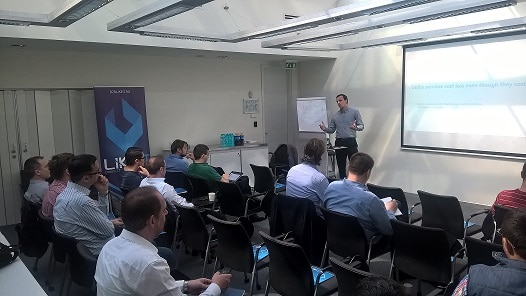Whether you’re seeking educational opportunities for yourself or exploring training for colleagues and employees, at some point you will likely come up against a decision: are your training needs best met by an open course or a bespoke training?
Here is a look at the advantages and disadvantages of public courses.
Advantages of Public Courses
Less in-house administration
Sending people to a public course involves less work than with an in-house custom training. The training company is the one that builds up an agenda, provides the trainer and chooses the location. Coffee breaks, lunch, and refreshments are also handled by the training company.
Fewer distractions for your colleagues
Once you have sent your colleagues to a public course, they are essentially free from any responsibilities of their usual daily activities. Therefore, all participants will be able to fully engage their attention on the topics discussed during the training.
External networking
Public courses allow your colleagues to talk to people from other companies and different backgrounds. This way they will most likely gain different points of view and discuss different approaches to common issues.
Get comprehensive training for your team
Discover a wide range of relevant public courses, from fundamental to advanced levels, all led by well-known industry experts.
Disadvantages of Public Courses
A more generalized approach
Delivering a public course means that participants will be coming from various job roles. Therefore, the trainers will have to present the content in a manner that will please the majority of the attendees. This makes the public course less specific and not as tailored to a company’s needs as a bespoke training.
Cancellations or postponing
Public courses usually require a minimum number of attendees. If the minimum number isn’t met, the training usually gets canceled or delayed until the number is reached. This can be particularly annoying if you have organized everything around the idea of the training occurring on a precise date, only to find out that it has been pushed back a month.
More expensive
Besides the public course fee, sending multiple people to a public course may sometimes involve travel & accommodations involved. This will significantly raise the cost per delegate of sending your colleagues to a training and will also increase the time it takes out of their schedule. Depending on the number of people attending, this may end up costing their company more than simply having the training delivered on-site.
Before you go
Read our similar guide on the Advantages and Disadvantages of Custom Training for more information. Hopefully, by reading them both, you can make an easier decision on what suits best your company’s training needs.
Get comprehensive training for your team
Discover a wide range of relevant public courses, from fundamental to advanced levels, all led by well-known industry experts.







